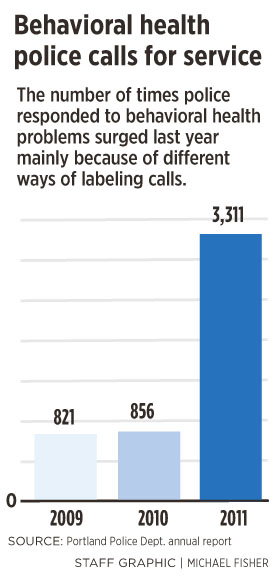PORTLAND — On its face, the Portland Police Department’s annual report shows that the number of police calls for people with behavioral health problems quadrupled last year over 2010.
But police officials say the new total is a more accurate reflection of the number of times police were summoned to deal with people who had mental health problems and were committing crimes or causing some type of disturbance.
“We know from an anecdotal standpoint that we deal with a lot of behavioral health calls for service,” said Police Chief Michael Sauschuck. But only a fraction of those calls are logged as such.
“There are other times when a call may come in as a burglary or a person bothering or disorderly conduct, when it really is a behavioral health call,” Sauschuck said. “We wanted to dig in and come up with a more accurate number.”
Accurate data can help the department better assign its personnel and influence the mental health resources available in a community.
Pat McKenzie, vice president for adult mental health at Opportunity Alliance, which provides mental health and other services in Cumberland County, said recognizing when mental health plays a role in criminal behavior can improve chances for treatment that can prevent the behavior in the future.
The 2011 crime statistics show 1,653 calls relating to behavioral health, a sharp increase from the year before. That increase occurred largely because emergency dispatchers are authorized to log calls as mental health-related if they have dealt with the person involved previously and know of the person’s mental health history.
The higher numbers may also reflect the growing number of people in mental health crisis because of the downturn in the economy, say mental health advocates.
Portland police assigned a staff person with a mental health background to read each report from 2011 — a total of 85,000 calls for service — to determine how many involved mental health issues. That added 1,457 behavioral health calls. Another 201 were flagged as mental health calls after the fact by responding officers. The total of 3,311 represents 4 percent of all police calls for service.
“I believe the numbers are still low, given the sheer volume of interactions we have on a daily basis with individuals in mental health crisis,” Sauschuck said. “We would love to have a set of data we can actual compare year to year so we can narrow this down.”
The behavioral health calls for service are often nuisance complaints, but sometimes are more serious calls. In either case, they take time to resolve. McKenzie, of Opportunity Alliance, said she was not surprised by the numbers. The agency’s crisis hotline gets 50,000 calls a year. It’s understandable that a fraction of those people with behavioral health symptoms would attract police attention.
“When you’re in trouble in our communities, there are a few places people go. The number we all call is, of course, 911,” she said. “Who is out there for the first line of defense? Our police.”
Opportunity Alliance has had a long relationship with Portland police and provides a liaison who responds along with officers to help them deal with people in mental health crisis.
That formed the basis for Portland police becoming a national model for how to approach people with mental illness. Almost every officer is trained in crisis intervention.
The department also employs a mental health coordinator, partially grant-funded, who oversees three interns pursuing master’s degrees.
The officer training and five staff members working on mental health issues helped to make Portland one of six places the Department of Justice and the Council of State Governments designated as a learning site to benefit other departments.
The calls for service that involve behavioral health issues can be analyzed to determine when and where such calls are most common.
“In a world of constantly shrinking resources, having the proper information helps us allocate resources appropriately,” Sauschuck said.
Staff Writer David Hench can be contacted at 791-6327 or at: dhench@pressherald.com
Send questions/comments to the editors.



Success. Please wait for the page to reload. If the page does not reload within 5 seconds, please refresh the page.
Enter your email and password to access comments.
Hi, to comment on stories you must . This profile is in addition to your subscription and website login.
Already have a commenting profile? .
Invalid username/password.
Please check your email to confirm and complete your registration.
Only subscribers are eligible to post comments. Please subscribe or login first for digital access. Here’s why.
Use the form below to reset your password. When you've submitted your account email, we will send an email with a reset code.